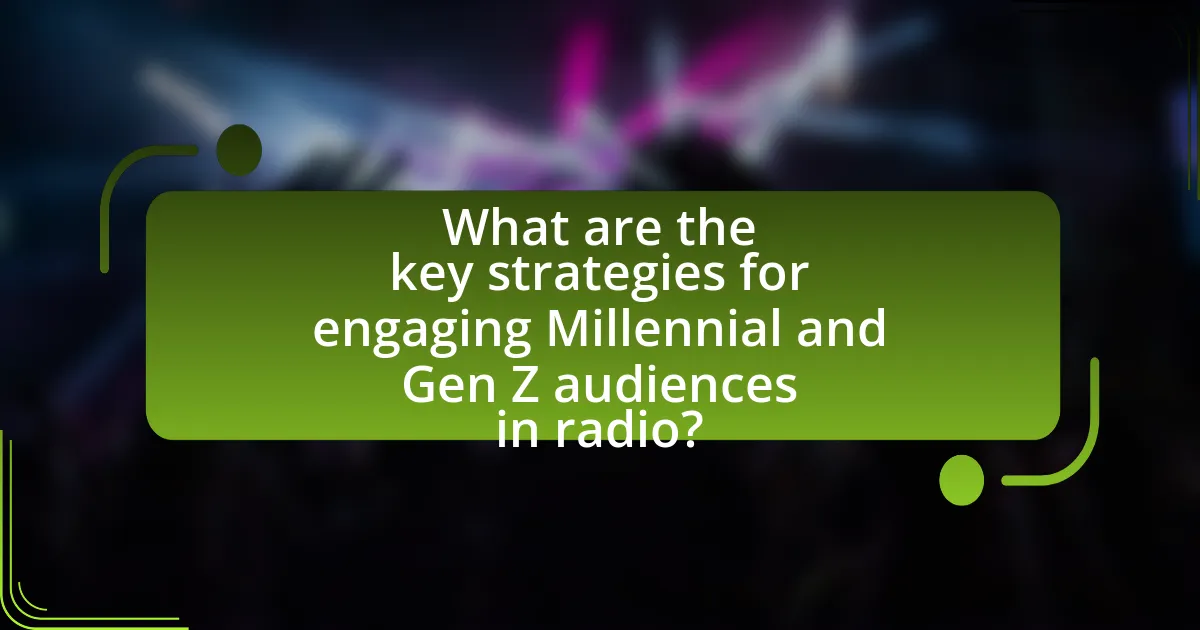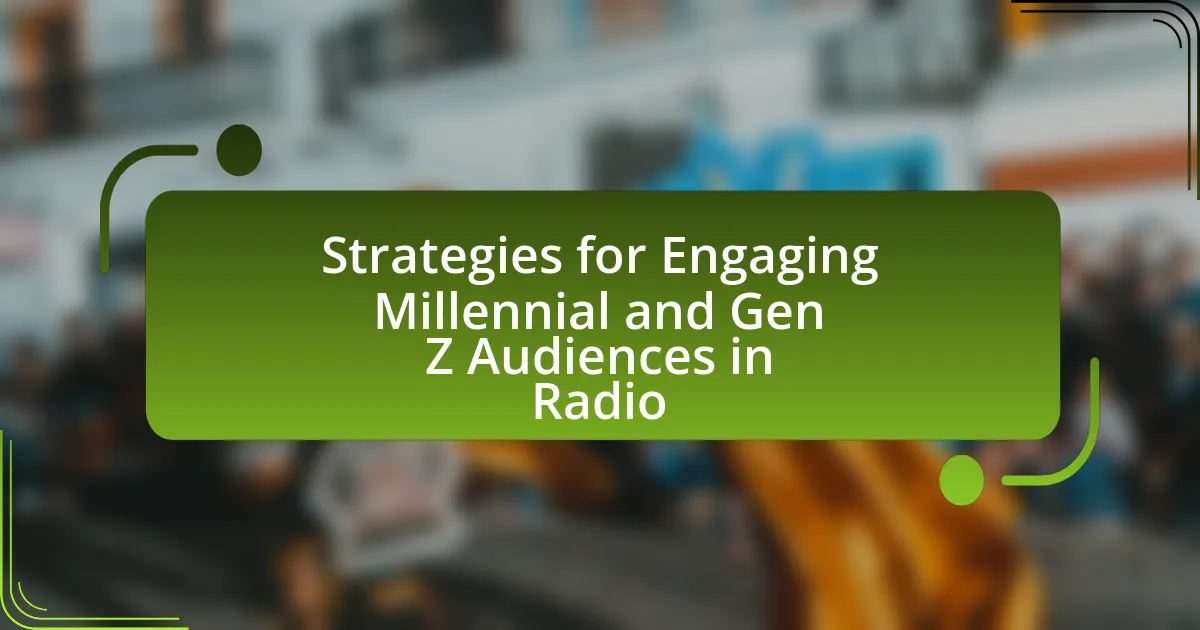The article focuses on strategies for engaging Millennial and Gen Z audiences in radio, emphasizing the importance of digital platforms, interactive content, and social media integration. It highlights the distinct listening habits of these generations, who prefer on-demand content and personalized experiences over traditional radio. Key insights include the significance of authenticity and social responsibility in content creation, as well as the role of interactivity in fostering listener engagement. Additionally, the article discusses the challenges radio faces in adapting to a competitive media landscape and offers practical tips for maintaining relevance and connection with younger audiences.

What are the key strategies for engaging Millennial and Gen Z audiences in radio?
To engage Millennial and Gen Z audiences in radio, key strategies include leveraging digital platforms, creating interactive content, and incorporating social media integration. Digital platforms, such as streaming services and podcasts, are essential as these demographics prefer on-demand content; for instance, 54% of Gen Z listens to music via streaming services. Interactive content, such as live polls and listener call-ins, fosters engagement and participation, which is crucial for maintaining interest. Additionally, integrating social media allows for real-time interaction and community building, as 90% of Gen Z uses social media daily, making it a vital channel for outreach and connection.
How do Millennial and Gen Z listening habits differ from previous generations?
Millennial and Gen Z listening habits differ from previous generations primarily in their preference for digital platforms and on-demand content. Unlike older generations who predominantly consumed radio and traditional media, Millennials and Gen Z favor streaming services and podcasts, with 62% of Gen Z listening to music via streaming platforms compared to 38% of Baby Boomers. Additionally, these younger generations exhibit a tendency to curate their own playlists and engage with content through social media, reflecting a shift towards personalized and interactive listening experiences. This change is supported by data indicating that 70% of Gen Z prefers to discover music through platforms like TikTok, highlighting their reliance on social media for music discovery rather than traditional radio.
What platforms do Millennials and Gen Z prefer for consuming radio content?
Millennials and Gen Z prefer digital platforms such as Spotify, Apple Music, and various podcast apps for consuming radio content. Research indicates that these generations gravitate towards on-demand audio services, with a significant portion of their listening time dedicated to streaming platforms rather than traditional AM/FM radio. According to a 2021 report by Edison Research, 54% of Gen Z and 49% of Millennials listen to online radio weekly, highlighting their preference for accessible and customizable audio experiences.
How does the use of technology influence their radio listening experience?
The use of technology significantly enhances the radio listening experience for Millennials and Gen Z by providing greater accessibility and interactivity. Streaming services and mobile applications allow users to listen to their favorite stations anytime and anywhere, which aligns with the on-demand culture prevalent among younger audiences. Additionally, social media integration enables real-time interaction with hosts and other listeners, fostering a sense of community and engagement. According to a 2021 Nielsen report, 63% of Millennials and 57% of Gen Z listeners prefer digital platforms for consuming audio content, highlighting the impact of technology on their listening habits.
Why is it important to understand the cultural values of Millennials and Gen Z?
Understanding the cultural values of Millennials and Gen Z is crucial for effectively engaging these demographics in radio. These generations prioritize authenticity, social justice, and inclusivity, which influence their media consumption habits. For instance, a 2021 survey by McKinsey found that 75% of Gen Z consumers are willing to pay more for sustainable products, highlighting their commitment to environmental issues. Additionally, research from Pew Research Center indicates that 60% of Millennials value brands that align with their social values. Therefore, recognizing and integrating these cultural values into radio content and marketing strategies can enhance listener loyalty and engagement.
What social issues resonate most with these generations?
Millennials and Gen Z are particularly resonant with social issues such as climate change, racial equality, mental health awareness, and social justice. Research indicates that 75% of Gen Z considers climate change a significant concern, reflecting their commitment to environmental sustainability. Additionally, both generations prioritize racial equality, as evidenced by their active participation in movements like Black Lives Matter, which gained substantial traction in 2020. Mental health awareness has also become a critical issue, with studies showing that 91% of Gen Z report feeling stressed about their future, highlighting the importance of mental health resources. These social issues are pivotal in shaping their values and engagement strategies in various platforms, including radio.
How do these values shape their media consumption choices?
Values such as authenticity, social responsibility, and inclusivity significantly shape the media consumption choices of Millennials and Gen Z. These generations prefer content that aligns with their beliefs and reflects their diverse identities, leading them to favor platforms and creators that demonstrate genuine engagement with social issues. For instance, a study by the Pew Research Center found that 70% of Millennials and Gen Z prioritize brands that take a stand on social issues, influencing their choice of media outlets and content creators. This preference drives them towards platforms that promote user-generated content and community engagement, as they seek relatable and trustworthy sources of information and entertainment.
What role does interactivity play in engaging these audiences?
Interactivity plays a crucial role in engaging Millennial and Gen Z audiences in radio by fostering a sense of participation and connection. This demographic values active involvement over passive consumption, leading to increased loyalty and satisfaction. Research indicates that 70% of Millennials and Gen Z prefer brands that engage them through interactive content, such as polls, social media integration, and live feedback mechanisms. By incorporating these interactive elements, radio stations can create a more immersive experience, enhancing listener retention and encouraging community building among audiences.
How can radio stations incorporate social media to enhance engagement?
Radio stations can enhance engagement by actively utilizing social media platforms to interact with their audience. By creating real-time polls, contests, and Q&A sessions on platforms like Instagram and Twitter, radio stations can foster a sense of community and encourage listener participation. For instance, a study by the Pew Research Center found that 69% of adults use social media, indicating a significant opportunity for radio stations to reach and engage with their target demographics. Additionally, sharing behind-the-scenes content and exclusive interviews on social media can create a more personal connection with listeners, further driving engagement.
What are effective ways to encourage listener participation and feedback?
Effective ways to encourage listener participation and feedback include utilizing interactive platforms, such as social media and mobile apps, to create real-time engagement opportunities. Research shows that 70% of millennials and Gen Z prefer to interact with brands through social media, making it a vital channel for soliciting feedback. Additionally, incorporating polls, Q&A sessions, and live chats during broadcasts can significantly enhance listener involvement, as these methods allow audiences to express their opinions and feel valued. Furthermore, incentivizing participation through contests or giveaways can motivate listeners to engage more actively, as studies indicate that rewards can increase participation rates by up to 50%.

What are the best content strategies for attracting Millennial and Gen Z listeners?
The best content strategies for attracting Millennial and Gen Z listeners include creating authentic, relatable content that resonates with their values and interests. These generations prioritize transparency and social responsibility, so content that reflects these principles tends to engage them effectively. For instance, incorporating user-generated content and interactive elements, such as polls or social media integration, fosters a sense of community and participation. Additionally, leveraging platforms like TikTok and Instagram, where these demographics spend significant time, can enhance reach and engagement. Research indicates that 60% of Gen Z prefers brands that engage with them on social media, highlighting the importance of a strong digital presence.
How can storytelling be utilized to connect with these audiences?
Storytelling can be utilized to connect with Millennial and Gen Z audiences by creating relatable narratives that resonate with their values and experiences. These generations prioritize authenticity and emotional engagement, making personal stories or shared experiences particularly effective. For instance, a study by the Pew Research Center found that 71% of Millennials and 67% of Gen Z prefer brands that tell stories reflecting their own values. By incorporating diverse voices and perspectives in storytelling, radio can foster a sense of community and belonging, which is crucial for engaging these audiences.
What types of stories resonate most with Millennials and Gen Z?
Millennials and Gen Z resonate most with stories that emphasize authenticity, social justice, and personal experiences. Research indicates that these generations prefer narratives that reflect real-life challenges and triumphs, often focusing on themes of diversity, mental health, and environmental issues. For instance, a study by the Pew Research Center found that 70% of Millennials and Gen Z value brands that take a stand on social issues, indicating a strong preference for stories that align with their values and beliefs. Additionally, storytelling that incorporates humor and relatability tends to engage these audiences effectively, as it fosters a sense of connection and community.
How can radio shows incorporate personal narratives to enhance relatability?
Radio shows can incorporate personal narratives by featuring authentic stories from hosts and listeners, which fosters a deeper emotional connection. This approach allows audiences to see their own experiences reflected in the content, making it more relatable. Research indicates that storytelling can significantly enhance engagement; for instance, a study by the University of California found that narratives can increase listener retention by up to 65%. By integrating personal anecdotes, radio shows can create a sense of community and shared experience, appealing directly to the values of Millennial and Gen Z audiences who prioritize authenticity and connection.
What types of music and programming appeal to Millennial and Gen Z listeners?
Millennial and Gen Z listeners are primarily drawn to genres such as pop, hip-hop, and electronic dance music (EDM). These genres resonate due to their upbeat tempos, relatable lyrics, and strong presence on social media platforms. Additionally, programming that includes podcasts, live-streaming events, and interactive content is highly appealing, as these formats allow for engagement and community building. According to a 2021 report by Nielsen, 67% of Gen Z and 61% of Millennials listen to music via streaming services, highlighting their preference for on-demand content that aligns with their lifestyles.
How does genre preference vary between these two generations?
Millennials and Gen Z exhibit distinct genre preferences in music, with Millennials favoring pop, rock, and hip-hop, while Gen Z shows a strong inclination towards genres like rap, electronic, and indie. According to a 2021 report by Nielsen Music, 60% of Gen Z listeners prefer hip-hop and rap, compared to 40% of Millennials, who lean more towards pop and rock. This shift reflects Gen Z’s exposure to diverse musical influences through digital platforms, leading to a broader acceptance of various genres.
What role does diversity in programming play in attracting these audiences?
Diversity in programming plays a crucial role in attracting Millennial and Gen Z audiences by fostering inclusivity and representation. These demographics prioritize content that reflects their diverse backgrounds and experiences, leading to increased engagement and loyalty. Research indicates that 83% of Gen Z consumers believe that brands should reflect the diversity of society, highlighting the importance of representation in media. By incorporating diverse voices and perspectives, radio programming can resonate more deeply with these audiences, ultimately driving higher listenership and participation.
How can radio stations leverage influencers to reach younger audiences?
Radio stations can leverage influencers by collaborating with them to create engaging content that resonates with younger audiences. Influencers possess established trust and credibility among their followers, which can enhance the reach and impact of radio promotions. For instance, a study by the Digital Marketing Institute found that 49% of consumers depend on influencer recommendations, highlighting their effectiveness in shaping purchasing decisions and brand perceptions. By integrating influencers into their marketing strategies, such as hosting live events or social media takeovers, radio stations can attract and retain the attention of Millennials and Gen Z listeners, ultimately driving higher engagement and listenership.
What are the benefits of collaborating with social media influencers?
Collaborating with social media influencers provides brands with enhanced reach and credibility among Millennial and Gen Z audiences. Influencers have established trust with their followers, which can lead to higher engagement rates and conversion rates for brands. According to a study by the Digital Marketing Institute, 49% of consumers depend on influencer recommendations when making purchase decisions, highlighting the effectiveness of influencer partnerships in driving consumer behavior. Additionally, influencers can create authentic content that resonates with younger audiences, making marketing messages more relatable and impactful.
How can radio stations effectively choose the right influencers for their brand?
Radio stations can effectively choose the right influencers for their brand by aligning influencer values and audience demographics with their own brand identity and target listeners. This alignment ensures that the influencer’s message resonates with the station’s audience, enhancing engagement and authenticity. For instance, a study by the Pew Research Center indicates that 71% of young adults trust influencers who share their values, making it crucial for radio stations to select influencers who genuinely connect with their brand ethos. Additionally, analyzing the influencer’s engagement rates and audience insights can provide data-driven evidence of their effectiveness in reaching Millennial and Gen Z audiences, further validating the choice of influencer.

What are the challenges and solutions in engaging Millennial and Gen Z audiences in radio?
Engaging Millennial and Gen Z audiences in radio presents challenges such as declining traditional listenership and competition from digital platforms. These generations prefer on-demand content and interactive experiences, making conventional radio less appealing. Solutions include integrating digital platforms, utilizing social media for promotion, and creating interactive content that resonates with their values and interests. For instance, a study by Nielsen in 2021 indicated that 63% of Gen Z listens to music through streaming services, highlighting the need for radio to adapt by offering podcasts and live-streaming options to capture their attention effectively.
What common misconceptions exist about Millennial and Gen Z listeners?
Common misconceptions about Millennial and Gen Z listeners include the belief that they prefer only digital content and lack interest in traditional media like radio. In reality, research shows that a significant portion of these demographics still engages with radio, particularly for music discovery and local news. According to a 2021 Nielsen report, 92% of Millennials and 87% of Gen Z listeners still tune into AM/FM radio weekly, indicating that traditional radio remains relevant. Additionally, there is a misconception that these generations are not loyal to brands; however, studies reveal that they value authenticity and connection, often forming strong attachments to brands that resonate with their values.
How can radio stations address these misconceptions to improve engagement?
Radio stations can address misconceptions by actively engaging with Millennial and Gen Z audiences through targeted content and interactive platforms. By utilizing social media channels and incorporating listener feedback into programming, radio stations can create a more relatable and inclusive environment. Research indicates that 70% of younger audiences prefer platforms that allow for two-way communication, highlighting the importance of interaction in building trust and loyalty. Additionally, showcasing diverse voices and perspectives in programming can counter stereotypes and foster a sense of community, further enhancing engagement among these demographics.
What strategies can be implemented to overcome generational stereotypes?
To overcome generational stereotypes, organizations can implement strategies such as fostering intergenerational dialogue and promoting inclusive representation. Fostering intergenerational dialogue allows individuals from different age groups to share experiences and perspectives, which can break down misconceptions. For instance, companies that encourage mentorship programs between older and younger employees have reported improved collaboration and reduced stereotypes. Promoting inclusive representation in media and marketing campaigns ensures that diverse age groups are accurately portrayed, which can challenge existing stereotypes and create a more nuanced understanding of each generation. Research indicates that brands that authentically represent multiple generations in their messaging see increased engagement across age demographics.
How can radio adapt to the fast-paced digital landscape?
Radio can adapt to the fast-paced digital landscape by integrating digital platforms and leveraging social media to enhance audience engagement. By creating content that is accessible on streaming services and social media channels, radio stations can reach younger audiences who prefer on-demand and interactive experiences. For instance, according to a Nielsen report, 93% of adults aged 18-34 listen to online radio, highlighting the importance of digital presence. Additionally, incorporating podcasts and live streaming can cater to the preferences of Millennial and Gen Z listeners, who favor personalized and flexible content consumption.
What technological advancements should radio stations embrace?
Radio stations should embrace digital streaming platforms, social media integration, and data analytics to engage Millennial and Gen Z audiences effectively. Digital streaming platforms allow for on-demand content access, which is crucial as younger audiences prefer flexibility in how they consume media. Social media integration enables real-time interaction and community building, fostering a sense of connection with listeners. Data analytics provides insights into audience preferences and behaviors, allowing stations to tailor content and marketing strategies to meet the specific interests of these demographics. According to a 2021 Nielsen report, 68% of Millennials and 72% of Gen Z listeners engage with radio content through digital platforms, highlighting the necessity for radio stations to adapt to these technological advancements.
How can radio stations stay relevant in a competitive media environment?
Radio stations can stay relevant in a competitive media environment by embracing digital platforms and engaging with audiences through social media. This approach allows radio stations to reach younger demographics, particularly Millennials and Gen Z, who predominantly consume content online. According to a Nielsen report, 93% of adults aged 18-34 listen to radio weekly, but they also spend significant time on social media, making it essential for radio stations to create interactive content that resonates with these audiences. By integrating live streaming, podcasts, and social media interactions, radio stations can enhance listener engagement and maintain their relevance in a rapidly evolving media landscape.
What are some best practices for maintaining engagement with Millennial and Gen Z audiences?
To maintain engagement with Millennial and Gen Z audiences, radio stations should prioritize authenticity and interactivity. Research indicates that 70% of Millennials and Gen Z value brands that are genuine and transparent in their messaging. Engaging these demographics through social media platforms, where they spend significant time, allows for real-time interaction and feedback, fostering a sense of community. Additionally, incorporating user-generated content and encouraging participation in programming can enhance their connection to the station. A study by Nielsen found that 63% of Gen Z listeners prefer content that reflects their interests and experiences, highlighting the importance of tailored programming.
How can radio stations measure the effectiveness of their engagement strategies?
Radio stations can measure the effectiveness of their engagement strategies through metrics such as listener feedback, social media interaction, and audience ratings. Listener feedback can be gathered via surveys and call-ins, providing direct insights into audience preferences and satisfaction. Social media interaction, including likes, shares, and comments, serves as a quantitative measure of engagement, reflecting how well content resonates with Millennial and Gen Z audiences. Audience ratings, often tracked through Nielsen ratings or similar services, offer a broader view of listener demographics and behavior, allowing stations to assess the impact of their strategies on overall listenership. These methods collectively provide a comprehensive understanding of engagement effectiveness.
What are practical tips for creating content that resonates with these generations?
To create content that resonates with Millennials and Gen Z, focus on authenticity, interactivity, and relevance. Authenticity is crucial as these generations value genuine voices and real experiences; for instance, 86% of Millennials prefer brands that are transparent. Interactivity enhances engagement, as both generations enjoy participating in content creation, such as polls or user-generated content. Relevance is essential; content should address current social issues or trends that matter to them, with 70% of Gen Z stating they want brands to take a stand on social issues. By prioritizing these elements, content creators can effectively connect with Millennial and Gen Z audiences in radio.



